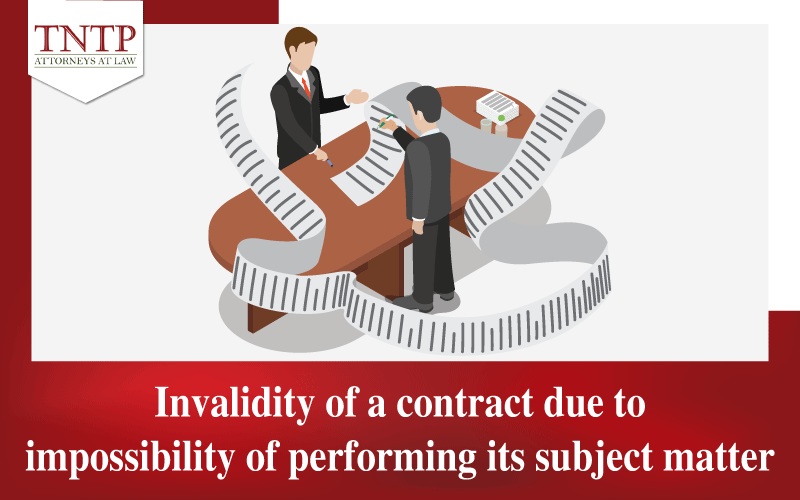Handling breaches of construction contracts in cases of force majeure
In the construction sector, contract performance can encounter many unforeseen factors, especially force majeure events such as natural disasters, wars, epidemics, or events beyond human control. When a force majeure event occurs, parties involved in a construction contract may face difficulties in fulfilling their obligations, potentially leading to contract breaches. This article will analyze the legal aspects of dealing with construction contract breaches in force majeure cases, including definitions, current legal regulations, handling measures, and related legal consequences.
1. Definition and characteristics of force majeure events
According to Article 156 of the 2015 Civil Code, a force majeure event is an objectively occurring event beyond the control of the contracting parties and cannot be foreseen or prevented, even after taking all necessary measures. In construction law, force majeure is defined in Clause 2, Article 21 of Circular 02/2023-TT-BXD, which includes: natural disasters, environmental incidents, acts of war, fires, and other force majeure factors.
Based on this definition and legal regulations, the characteristics of a force majeure event in a construction contract includes:
• Objectivity: The force majeure event occurred in the objective manner, no party causes the event to occur.
• Unforeseeable: At the time of contract formation, the parties could not foresee the force majeure event.
• Unavoidable and cannot be overcome: The consequences of the event cannot be resolved, even after taking all necessary measures within the parties’ capabilities.
2. Legal regulations on force majeure in construction contracts
When a force majeure event occurs, the affected party must notify the other party in writing as soon as possible. Additionally, according to Article 141 of the 2014 Construction Law and Clause 4, Article 51 of Decree 37/2015/ND-CP, the parties are required to agree on how to deal with force majeure events in their contracted terms.
The 2015 Construction Law and other construction legal documents do not specify exemptions from liability when a force majeure event occurs. However, according to Clause 1, Article 2 of Decree 37/2015/ND-CP, a construction contract is a civil contract. Therefore, Clause 2, Article 351 of the 2015 Civil Code can be applied, which states that the obligated party is not liable for damages to the other party when a force majeure event occurs. However, to be exempt from liability due to force majeure, the affected party must prove that:
• The force majeure event is the direct cause preventing fulfillment of obligations.
• The other party was notified of the force majeure event and its impact on contract performance.
Additionally, certain formed construction contract may contain clauses on dealing with force majeure, specifying time extensions or remedial measures when such events occur. These clauses are often crucial parts of the contract, ensuring that both parties understand their rights and responsibilities should a force majeure event arise.
3. Measures for handling contract breaches in the event of force majeure
In construction, when force majeure conditions lead to a contract breach, the parties may agree to adjust the construction contract. However, adjustments to the construction contract should only apply within the contract performance period, including any legally extended periods. Options for handling contract breaches due to force majeure events include:
• Adjust contract performance time: The parties may agree to extend the contract performance period during the occurrence of the force majeure event. This ensures the contract will resume once the event concludes.
• Adjust project scope: In some cases, the parties may agree to adjust the project scope to suit the post-force majeure conditions.
• Adjust contract schedule: If the force majeure event directly impacts the project’s schedule, the parties may agree to modify the schedule to align with the current situation.
• Adjust contract price: In cases where the force majeure conditions significantly alter project costs, the parties may agree to adjust the contract price to reflect actual incurred costs.
• Terminate the Contract: In cases where the force majeure event occurs for too long and cannot be overcome, the parties may terminate the contract. This is generally done when no other options remain to secure the rights and obligations of the parties. The termination process must comply with legal provisions and contract terms to avoid disputes.
4. Legal consequences of contract termination due to force majeure
When a construction contract is terminated due to force majeure, the parties must settle completed payments according to contract terms prior to the force majeure event. Additionally, the resolution of assets, unfinished tasks, and compensation for costs incurred during contract performance must be conducted as agreed.
• Liability for damages: In most cases, parties are not liable for damages when a force majeure event leads to contract termination.
• Dispute resolution: If there are disagreements when dealing with the force majeure event, the parties may take the matter to court or arbitration for resolution.
Dealing with construction contract breaches in the event of force majeure requires flexibility and strict compliance with legal regulations and agreed contract terms. Parties should proactively notify, document, and agree on handling measures to mitigate arising risks. In all cases, a clear and well-structured contract detailing the rights and responsibilities of the parties during a force majeure event is a solid foundation for effective dispute resolution.
The article “Handling breaches of construction contracts in cases of force majeure” is brought to you by TNTP. TNTP hopes this article will be helpful to you.



